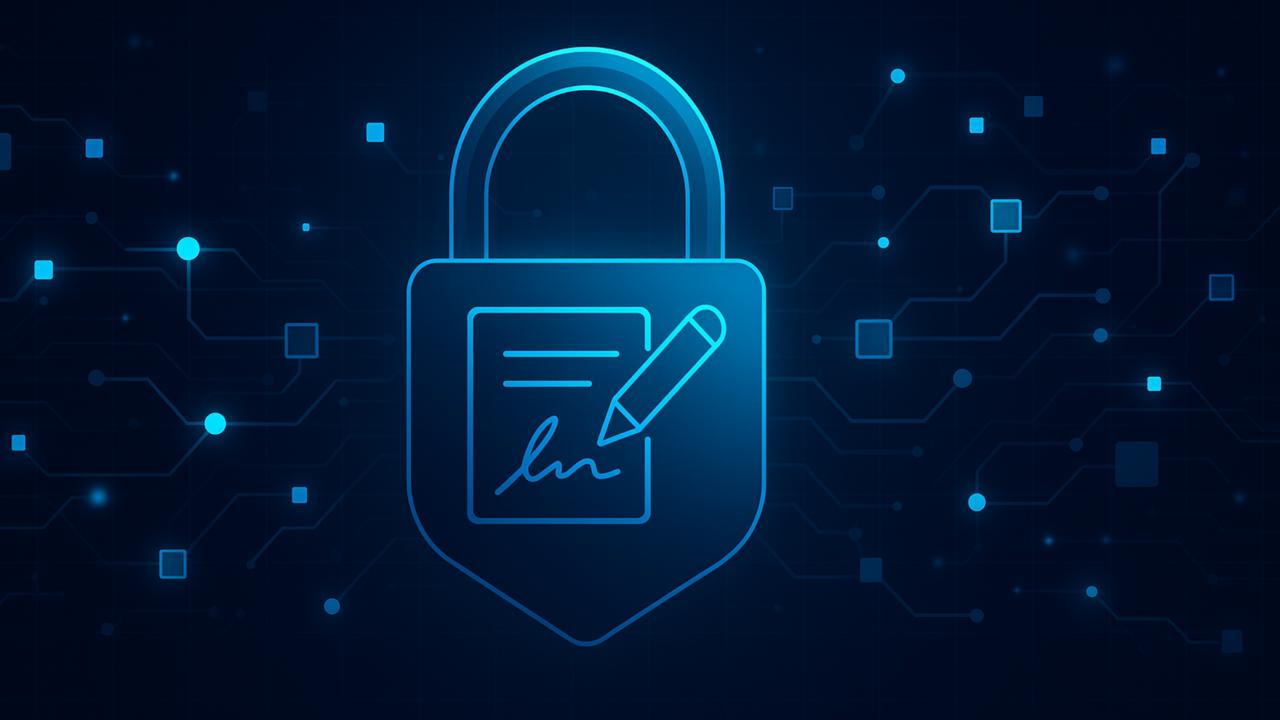In today’s fast-paced digital world, businesses and individuals are shifting from traditional cumbersome paper-based processes to streamlined electronic solutions. One of the key innovations driving this change is the adaptation of digital signatures as a secure, electronic, paperless alternative to conventional handwritten signatures. Digital signature solutions both companies and consumers by offering, enhanced security, improved efficiencies, positive environment impact, cost savings and maintained regulatory compliance/legal requirements. Simplifying the document handling and storage process for both business and its customers.
This blog post explores why digital signatures are superior to conventional signatures in modern transactions and how they will improve your business.
Enhanced Security and Authentication
The primary advantage of digital signatures is their robust security. Unlike conventional signatures, which can be easily forged or tampered with, digital signatures use cryptographic encryption to verify authenticity. A digital signature relies on public key infrastructure (PKI), ensuring that:
- The signature belongs to the intended signer.
- The document remains unchanged after signing.
- Any unauthorised modifications can be detected.
This level of security makes digital signatures highly reliable for sensitive documents, such as contracts, legal agreements, and financial transactions or any situation where regulatory compliance must be maintained.
Improved Efficiency and Convenience
Traditional signatures require physical presence of the signee or document delivery, leading to delays and significant increase in waste due to duplication of printed material. In contrast, digital signatures allow users to sign documents from anywhere, anytime, using a secure online platform. This results in:
- Faster approval processes.
- Reduced paperwork and manual handling.
- Streamlined remote collaboration.
For businesses operating across multiple locations, digital signatures eliminate the need for courier services or in-person meetings, saving valuable time. Your customers don't have to leave work early to print sign and return documents. Traditional long turn around process can be completed in minuets with a highly secure guarantee on the information communicated.
Cost Savings
Traditional paper-based signature processes involve increasing costs related to printing, scanning, shipping, and storage. The use of digital signatures eliminates most of these and drastically reduce the others by providing a fully electronic workflow and digital archive of the information. Organisations will save money on:
- Paper and printing supplies for the organisation and end user.
- Courier and mailing costs.
- Storage of archived information.
- Organisation processing time.
Over time, these savings contribute to a more sustainable and cost-effective document management system by reducing overheads and speeding up process times.
Legal Validity and Compliance
Digital signatures are legally recognised in many countries under laws such as the The Electronic Transactions ACT 1999 (ETA) in Australia, Electronic Signatures in Global and National Commerce (ESIGN) Act in the U.S. and the eIDAS Regulation in the European Union. These laws ensure that digital signatures are legally binding, just like handwritten signatures. Additionally, digital signatures help businesses comply with industry-specific regulations, such as:
- GDPR - General Data Protection Regulation (European Union).
- HIPAA - Health Insurance Portability and Accountability Act (USA).
- SOX - Sarbanes-Oxley Act (USA).
- Privacy ACT 1988 (Australia)
- PIPEDA - Personal Information Protection and Electronic Documents Act (Canada)
By adopting digital signatures within your organisation, you can ensure regulatory compliance and associated process is simplified and maintained while reducing your legal risks.
Environmental Benefits – Paperless/Paper Light Office
The use of digital signatures contributes to eco-friendly business practices by supporting the paper less/Paper Light office by minimizing paper waste both internally within their organisation and externally by their clients and end users. Companies that switch to digital workflows reduce their carbon footprint by:
- Contributing to the reduction of paper production and deforestation.
- Reducing energy consumption associated with printing and transportation.
- Lowering waste from discarded documents.
For organisations focused on sustainability, digital signatures align with corporate social responsibility goals.
Better Document Integrity and Audit Trails
Conventional signatures can be difficult to verify, the scan quality and even the colour/type of pen used by the customer can not verified as suitable until returned to the sender, extending the process time to repeat. There is also another copy of the document now in circulation leading to confusion and potential audit concerns. Physical documents can be misplaced leading to loss of customer personal information of company intellectual property or the physical document can be altered without detection. Digital signature solutions offer:
- Tamper-proof encryption, ensuring document integrity.
- Timestamping, which records when a document was signed.
- Audit trails, tracking every step of the signing process.
- Storage of data online in secure encrypted locations enabling access to only the prescribed users.
These features make digital signatures ideal for regulatory compliance, legal and financial transactions where document authenticity and safeguarding of information is critical.
Maintaining Trust and Confidence with Your Customers
Digital signature solutions offer a high level of security and encryption on the data that is captured as part of the process. Customers can trust that their personal information held within the document is stored digitally utilising a higher level of security that what can be provided in a handwritten environment. Digital signatures offer confidence by;
- Removing the need for multiple uncontrolled versions of the data to be printed.
- Secure, encrypted storage methods permitting only authorised access.
- Reduction in human error due to digital process.
Digital signatures offer enhanced security, cost savings, efficiency, customer relation and environmental benefits over conventional signatures. As businesses and individuals continue to embrace digital transformation, adopting digital signatures is a must for secure, legally compliant, and streamlined document management.
If you haven’t yet transitioned to digital signatures, now is the time to explore how they can improve your workflow and reduce operational costs.
Visit datasafesign.com to find a solution that will work for your business needs.





